An Essential Guide to Social Media For Small Businesses
Table of Contents
- How Social Media Can Help Small Businesses
- The Need for Social Media For Small Businesses
- Social Media Marketing for Small Businesses
- Key Takeaways
- Conclusion
- FAQs
The last decade saw exponential growth in the use of social media worldwide. The latest statistics show that social media users stand at 4.20 billion, about 53.6% of the total population. India alone has 448 million active social media users.
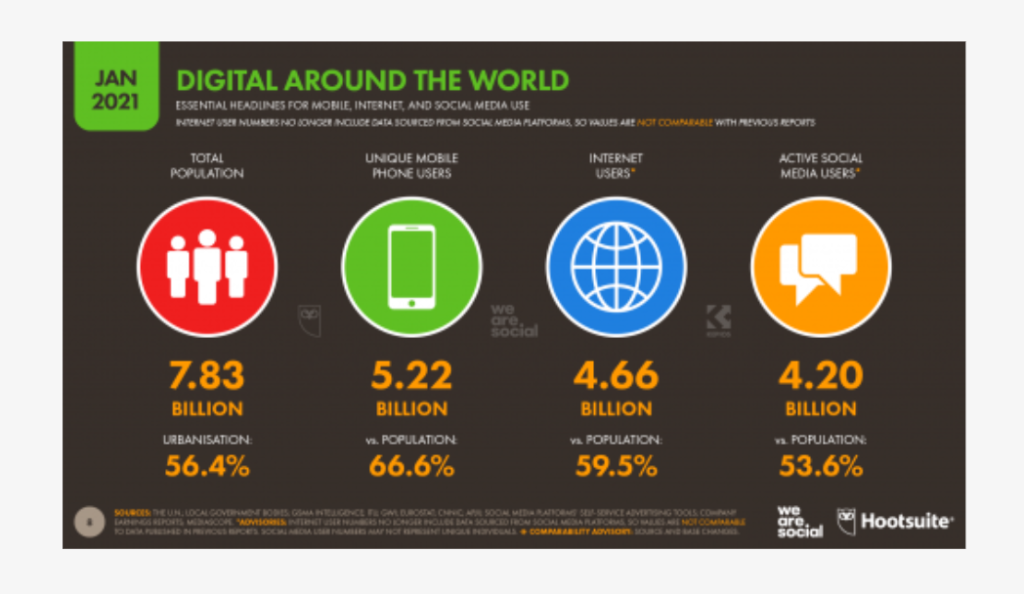
People today are spending more time on social media apps; it has become one of the most valuable assets for businesses of all sizes. But in this blog, we will only discuss social media marketing for small businesses.
In a hyper-digitalized world, amid a raging pandemic, optimizing social media for small businesses becomes imperative. Small businesses can use social media to find, connect and engage with their audience. Social media can be an effective platform for interacting with customers to increase brand recognition and generate leads for small businesses. If done right, a small business social media strategy can increase your presence and shoot your sales graph in a short time.
How Social Media Can Help Small Businesses
First, you must know what social media marketing means. Using social media platforms to promote your business and its products or services is known as social media marketing. How social media helps small businesses? Social media marketing enables small businesses to build stronger customer relationships, increase reach, and even develop an authentic and strong brand image.
With the challenging times coming along with COVID-19, there have been significant reductions in the finances of small businesses. But even with a low budget, social media marketing for small businesses can achieve big goals. According to a survey by Dun & Bradstreet, “…more than 82% of small businesses had a negative COVID impact…”
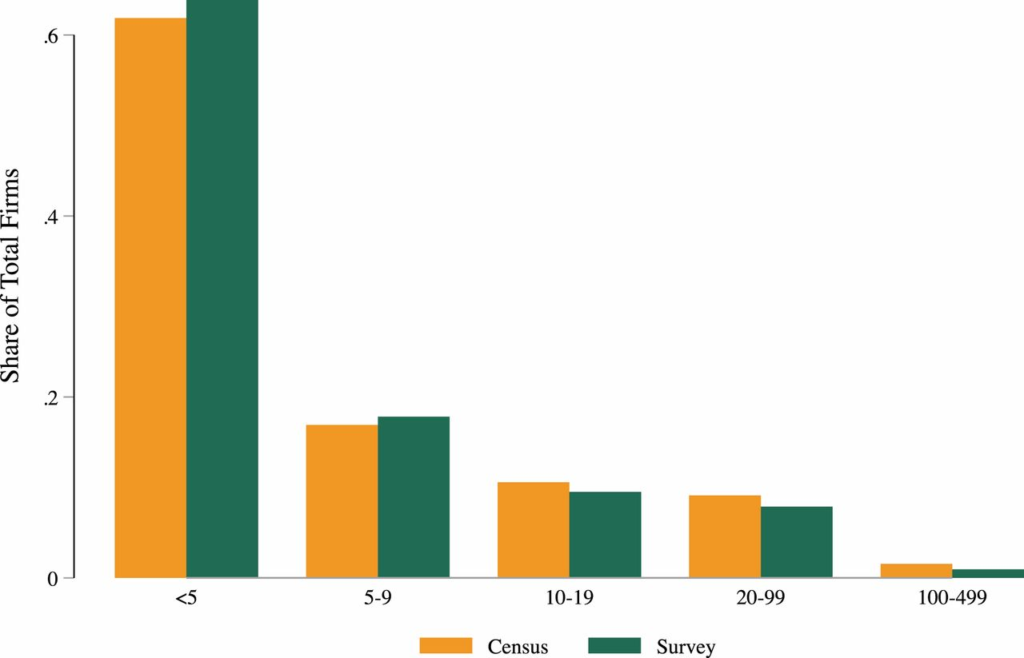
Some of the benefits of social media marketing for small businesses can be listed as:
- It is low cost but is more effective in marketing and advertising. This lets you run flexible campaigns to reach your audience and generate more leads.
- Social media marketing helps small businesses segment and target customers based on demographics (i.e., age, location, gender, etc.). This can be done with the help of various analytical tools and surveys.
- Small business social media strategy offers opportunities to better engage with customers through various posts, events, groups, etc.
- Social media is one of the most preferred customer-service tools. It helps you respond to queries, issues, and feedback. Customer feedback is the biggest asset for small business social media strategists.
The Need for Social Media For Small Businesses
A small business social media marketing strategy is like your plan of action. It will guide you on what you’ll post, the social media platforms you will use, and define your measurable goals. A well-planned and well-executed social media strategy can increase brand awareness, expand your customer base, and increase sales and revenue.
For instance, at FreshMenu, their approach was to plan and execute digital marketing campaigns to promote their brand.
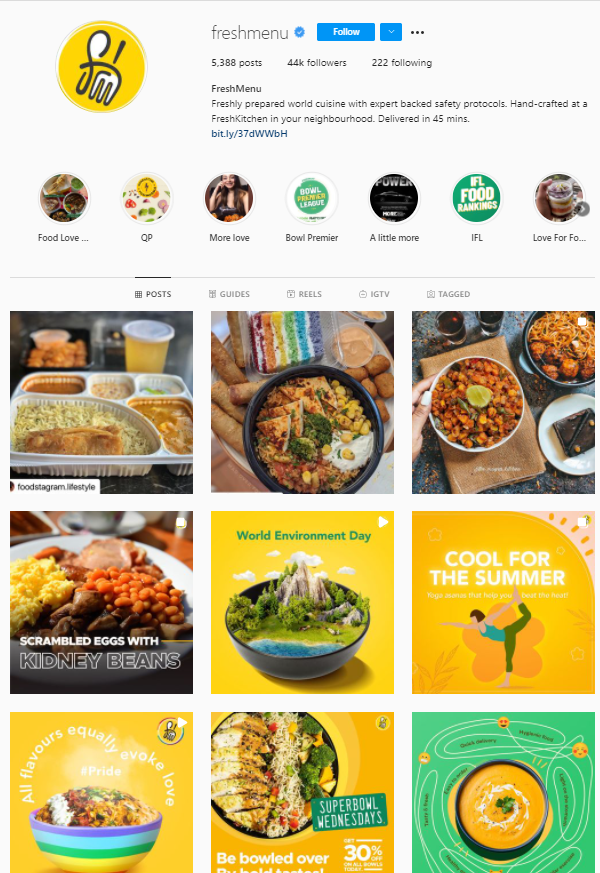
They keep their audience engaged by offering fascinating articles about food origins. To attract more customers, they hold frequent contests and provide coupons. The feedback helps their social media strategists to plan their next course of action.
Social Media Marketing for Small Businesses
Below is a guide on creating and executing good digital marketing strategies for small businesses.
1. Set measurable goals
All these steps might seem intimidating, but things will fall in place as you move from one stage to another. So, you should start your small business social media strategy by setting your goals; what do you want to do with your social media? Is it driving sales, traffic, building a brand image, etc.?
Selecting the right goals can help you track your progress and determine which campaigns are more effective.
The right goal is,
- Well defined and relevant
- Measurable
- Achievable
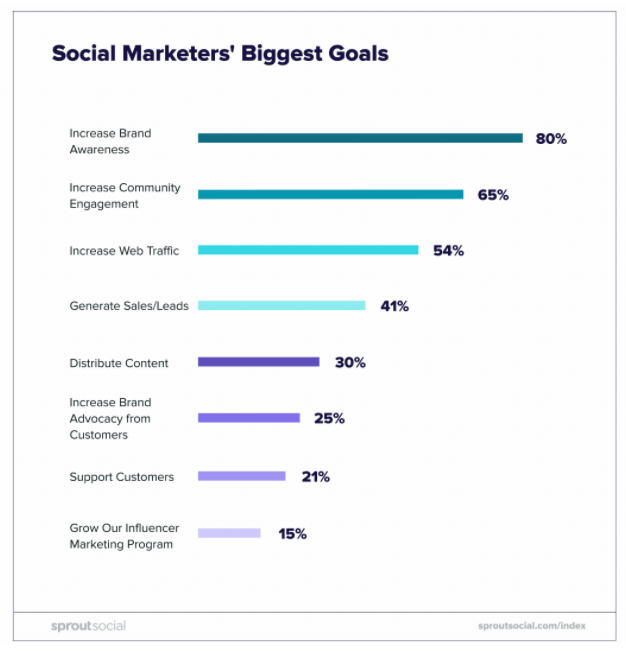
2. Identify and choose the right social media platforms
Every social media platform is different with its pros and cons. So you must match your needs and target audiences with various social media platforms’ attributes. This will help you choose the most relevant platform for your small business to kick-start with. And with time, you can expand your presence on other platforms, too.
Ideally, if you are selling lipglosses, you want to establish a presence on Facebook and Instagram. Again, if you are selling the best content planners, you may post on Linkedin. Your social media platform of choice should depend on your target audience. If you do not keep your target audience in mind, social media marketing won’t show the best results for your small business.
The following list of top 3 social media sites will help you identify the best-suited platform for your business:
Instagram, the most visually appealing social media network, has the third-largest user base. The monthly-active-users count of Instagram stands at 1 billion. With posts and stories, you can plan your Instagram presence to concentrate on your company goals and the desires of your audience. It has a diverse range of users, giving your social media small business strategy ample scope to expand.
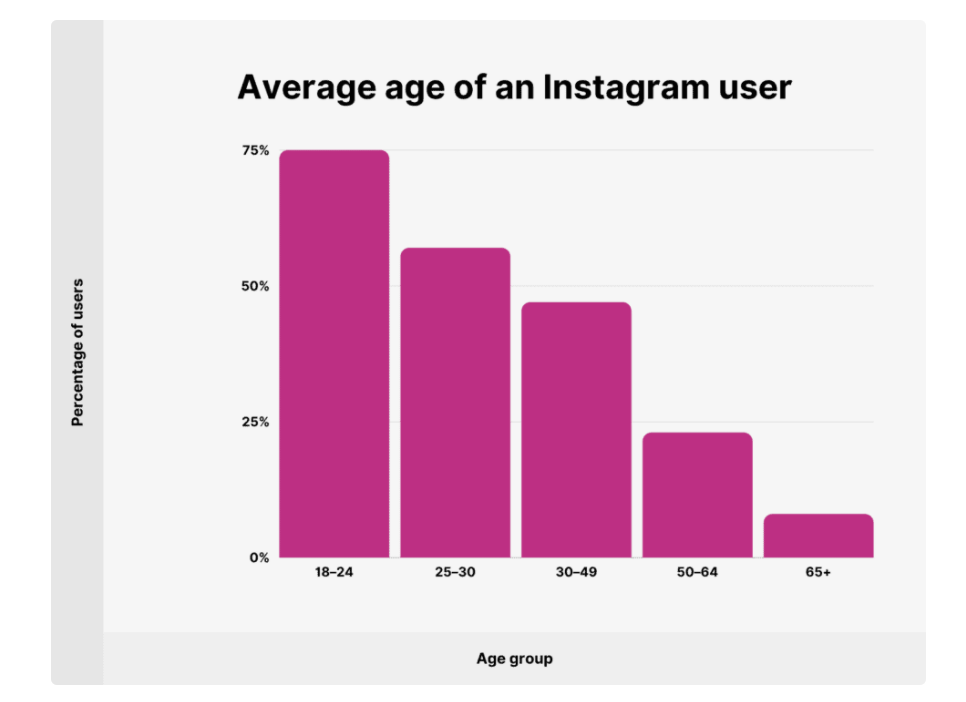
Instagram is ideal for you if your goal is
- To exhibit your products or services in action.
- To target a vast customer base, especially millennials and Gen Z.
- To sell products and build brand image.
- To grow a fan base for your brand.
Content to post: Stories, Pictures, Videos, and Carousels.
Bonus tip: Instagram has a unique and compelling feature called User Generated Content (UGC). You can use Instagram to generate and share organic user-generated content (UGC) related to your products or services. Such social media marketing tools are essential for small businesses, as they do not have a huge budget.
With 2.6 billion monthly active users, Facebook is the most popular social media platform globally, so prioritizing it is a no-brainer. In 2022, you must use Facebook for social media marketing for your small business.
As a small business, you want to run accurately targeted marketing campaigns on whatever budget you decide, and Facebook advertising allows you to do that. If people like your Facebook page, they’re probably interested in receiving updates from you.

Facebook is ideal for you if your goal is
- To target millennials or older generations.
- Include lead generation or conversion mainly.
- To target as many individuals as possible or a very focused niche audience.
Content to post: Facebook advertisements, images, and videos. Varying content regularly keeps the audience engaged.
Bonus Tip: Stay casual and friendly, but make sure you value the audience.
Twitter is a massive network of people and businesses communicating in a smooth and fast-paced setting. It is one of the most widely used social media platforms for news, with a global user base of 187 million daily users. Twitter’s brief content section is a fantastic place to promote your business. As it has a global reach, it is a perfect platform for your small business’s social media strategy.
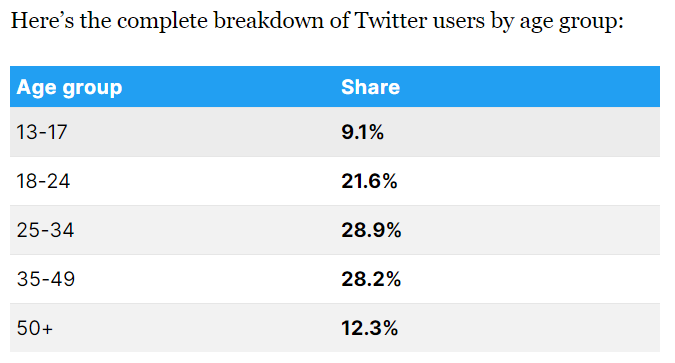
Instagram is ideal for you if your goal is
- To target Gen Z or millennials
- To increase brand awareness and stronger customer relationships
- To target people with higher levels of income and education.
Content to post: Interactive but brief tweets and eye-catching images and videos.
Bonus tip: Keep it light and engage – a lot!
3. Create and schedule your posts
In social media marketing, consistency is the key. Consider your social media profiles as extensions of your company’s voice, values, and personality. Make your brand’s identity a part of your digital marketing rules and let each post reflect your unique identity.
You should plan posts ahead of time (at least a week ahead of time) to keep your brand active on social media. As a small business, you probably have many roles to juggle. Your social media marketing would reach new heights if you have a content calendar in place to track your posts.
4. Use tools to track your goals and growth
You’re almost ready to get started now that you have all the knowledge you need to create a social media strategy for your small business.
Ensure that you regularly track your performance by creating customized reports that showcase the most important metrics to you (depending on your goals). To assess which type of content works, analyze metrics like organic reach, click-throughs, and follower demographics.
Key Takeaways
- Social media users stand at 4.20 billion, about 53.6% of the total population. India alone has 448 million active social media users. This is the best time for small businesses to utilize the magic of social media marketing to build brand awareness.
- Social media marketing for small businesses means using social media platforms to promote products or services.
- A well-planned and well-executed social media strategy can increase brand awareness, expand your customer base, and increase sales and revenue.
- Selecting the right goals can help you track your progress and determine which campaigns are more effective. Social media marketing, especially for small businesses, is built on consistency.
- If you are using social media for your small business, try to have a content calendar in place. It will help you track your ideas and maintain a consistent posting schedule.
- Small business social media strategy will not show results overnight. Be patient. Set measurable goals to track progress.
- The most important thing to note for small businesses wanting to optimize social media marketing is to choose the right platform.
Conclusion
Social media marketing for small businesses is not difficult. You need to plan and start posting, tweeting, uploading, and sharing. This will add value to your audience and nurture their brand affinity. Maintaining an online presence is time-consuming. You need to be patient when doing social media marketing for small businesses.
However, soon you will gain a following, and consumers will interact with your posts. The most crucial aspect of nailing social media marketing for small businesses is to post relevant and meaningful content. Try to use visually appealing posts and humorous and relatable captions. You can easily convert your target audience into customers and shoppers with a bit of effort.

FAQs
Some social media marketing tips for small businesses are as follows:
1. Identify your audience.
2. Engage with your audience.
3. Create a social content calendar.
4. Post your content at the right time.
5. Audit your social marketing efforts.
6. Create great infographics.
Social media marketing could change the face of small businesses. It would spike your reach by a significant margin. Social media is powerful for building brand awareness. It attracts new customers, offers a platform for your current customers to promote your brand to their connections, and fosters engagement. Suppose you have an active social media presence. In that case, you appear trustworthy and more ‘human.’ In a hyper-digitalized space, brands need to use social media, especially small businesses, to get closer to their target audience.
If you wonder how social media helps small businesses, let us tell you. Social media marketing uses social media and social networks for marketing a company’s products and services. It is a way to engage with existing customers and reach new ones. As your reach grows, you receive more engagement, and in turn, you receive tons of blog traffic.
The world of social media marketing is huge. Small businesses, especially today, have lots of resources and platforms to utilize. Social media platforms like those listed below help small businesses reach their products and services to their primary consumers.
1. Social networks like Facebook, Twitter, Linkedin, Snapchat, Whatsapp, etc.
2. Social news websites like Digg, Grow News, Reddit, Newsvine, Mashable, Bloomberg, etc.
3. Microblogging like Tumblr, Plurk, Gab, VK, Plerb, Twister, Soup.io, etc.
4. Bookmarking sites like Pinterest, StumbleUpon, Dribble, Pocket, Slashdot, Reddit, Twitter, etc.
5. Media sharing like Flickr, Pinterest, Facebook, Twitter, Youtube, Pinterest, Linkedin, etc.
6. Community blogs like WordPress, Wix, Squarespace, Joomla, Medium, etc.
Digital marketing is ideal for people who are creative and analytical. It is a bonus if you are good with numbers since digital marketing includes data analysis and statistics. Managing social media marketing for small businesses could be a satisfying career choice if you love growth, are familiar with social plugins like WordPress, and have many creative ideas. If you can make your imagination soar and find innovative ways to appeal to your target audience, your small business social media strategy will surely succeed.
The most important aspect of digital marketing is consistency. Recently, Hubspot discovered that sites with fewer than 10,000 fans saw a 50% decline in engagement per post if they posted more than once a day. That’s why you should perhaps post on your Facebook Page at least three times every week. The best times to post on Twitter are Wednesdays from 9 am to 3 pm, and Tuesdays through Thursdays from 9 am to 11 am. On the contrary, you will get the lowest engagement from 10 pm to 4 am. According to Sprout Social, the latest optimum times to post on Instagram have grown to three days each week, Mondays, Tuesdays, and Fridays. It remains the highest right before lunch at 11 am, with a surge in interaction on Tuesdays at 2 pm. Social media marketing for small businesses must focus on quality over quantity. You have to gain the trust of your existing customers and build new relationships. Try to post meaningful, targeted, and relevant content thrice a week on all platforms.
Latest Blogs
Explore how Google’s 2025 AI search updates triggered ranking chaos. Learn actionable strategies to adapt your SEO for AI Overviews, zero-click searches, and SERP volatility. Stay ahead now.
Learn how to rank on AI search engines like ChatGPT, Perplexity, and Gemini by optimizing your content for authority, structure, and relevance. Stay ahead in AI-driven search with this strategic guide.
Explore the best healthcare SEO services for your medical practice. Improve online visibility and effectively reach more patients in need of your services.
Get your hands on the latest news!
Similar Posts

Artificial Intelligence
5 mins read
Enhance Your Writing Efficiency: Must-Have Content Writing Tools for Marketers

Marketing
5 mins read
9 Key Strategies To Increase Twitter Reach

Marketing
6 mins read